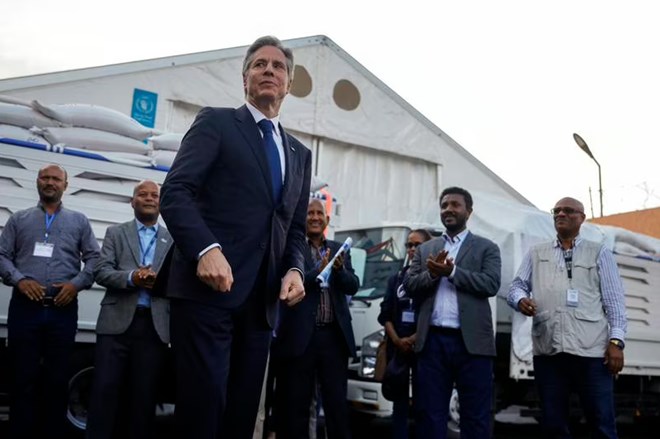
Friday March 17, 2023

US Secretary of State Antony Blinken visits a UN logistics centre in Addis Ababa, Ethiopia, on Wednesday. EPA
US Secretary of State Antony Blinken discussed with officials in Ethiopia a dispute with downstream Egypt over Ethiopia’s completion of Africa’s largest hydroelectric dam.
Egypt and Sudan have been in talks with Ethiopia for almost a decade to reach an agreement on the filling and operation of the Grand Ethiopian Renaissance Dam (Gerd).
On the sidelines of the US-Africa Leaders Summit in Washington in December last year, Egypt's President Abdel Fattah El Sisi reiterated to Mr Blinken the necessity of reaching a legally binding deal.
While details of Mr Blinken's talks with Ethiopian leaders on the dam issue were not disclosed, Mr Blinken made it clear that the US wants Ethiopia to demonstrate progress in implementing a deal to end the Tigray conflict before normalising relations.
Visiting Ethiopia to repair relations that were strained by the two-year war in the northern region, Mr Blinken met Prime Minister Abiy Ahmed and discussed continuing efforts to solidify peace, restore basic services and address humanitarian needs.
Still, he stopped short of ushering the country back into a US trade programme.
Ethiopia must ensure “there are no ongoing gross violations of human rights” and establish an “inclusive and credible” transitional justice process, Mr Blinken said in Addis Ababa on Wednesday.
“Then our own ability to move forward on our engagement with Ethiopia, to include economic engagement, will also move forward,” he said.
The US government restricted economic and security assistance to Ethiopia during the war and cut access to the US African Growth and Opportunity Act (Agoa), a duty-free trade programme that had been a boon for the country's textile sector.
“Certainly we share the aspiration of Ethiopia returning to Agoa,” Mr Blinken said. “It's moving in the right direction.”
During a visit to a UN logistics warehouse, Mr Blinken announced $331 million in new humanitarian aid, life-saving support for people affected by conflict, drought and food insecurity.
Mr Blinken is on a four-day trip to Africa that includes Niger. He is due to visit the African Union, based in Ethiopia, on Thursday.
Hundreds of thousands of people were killed in the Tigray conflict before the peace agreement was signed in November. Communications, banking and other basic services in the region of more than five million people were cut off and only recently began to resume.
Out of concern for massacres, gang rapes and other abuses committed by all sides in the fighting, the US imposed sanctions and restricted economic support to Ethiopia.
Bill to rebuildEthiopia, facing a post-conflict reconstruction bill of $20 billion, is eager to see economic and other assistance from the US and others return, but there are concerns about how the government will address the widespread human rights abuses.
The government has objected to a UN commission of inquiry and seeks to block its funding.
“There’s a lot to be done,” Mr Blinken told Ethiopian Foreign Minister Demeke Mekonnen. “But the most important thing is to keep the peace that has now taken hold in the north and to strengthen our ties as we move along.”
Humanitarian organisations now returning to Tigray report hunger and lack of medical supplies, with many health centres damaged or destroyed.
A major challenge is the presence of troops from neighbouring Eritrea, which was allied with Ethiopia’s government in the conflict and was not a party to the agreement.
Observers say the Eritreans have pulled back to border areas.
Mr Blinken is expected to meet African Union Commission chairman Moussa Faki Mahamat on Thursday morning.
Mr Blinken will fly to Niger on Thursday, where he will become the first secretary of state to visit the landlocked West African nation.
He will hold discussions on regional security in the Sahel region, where militants have waged an insurgency for almost a decade that has killed thousands of people and displaced millions more.
Terrorist attacks have more than doubled in sub-Saharan Africa since 2016, even as worldwide deaths from terrorism have declined, the UN Development Programme said in a January report.
About half of all terrorism-related deaths were in sub-Saharan Africa, with only four countries — Niger, Somalia, Burkina Faso and Mali — accounting for more than one third of the fatalities, it said.